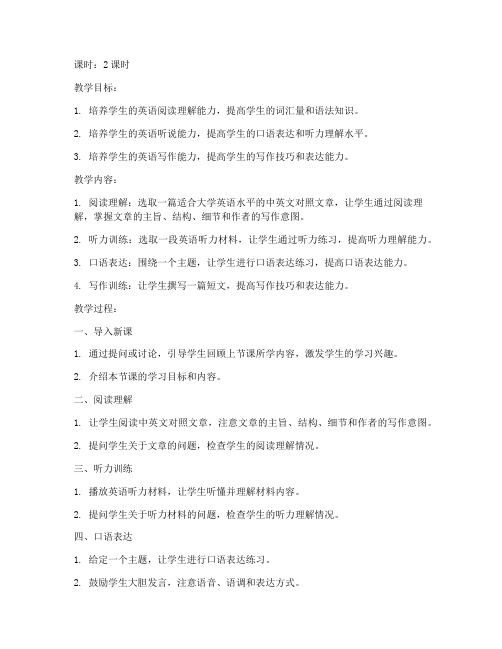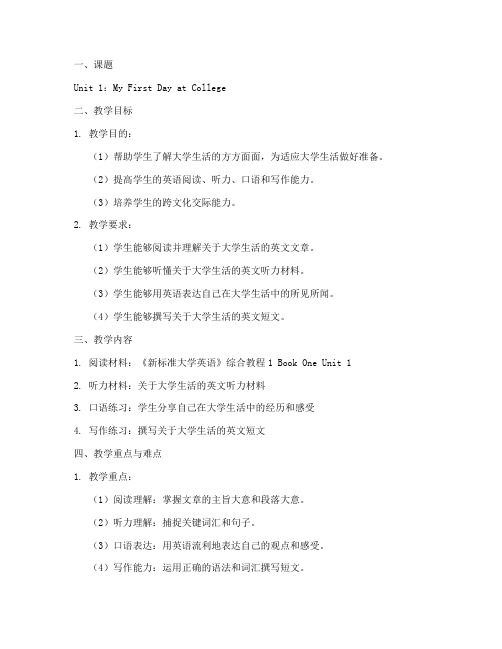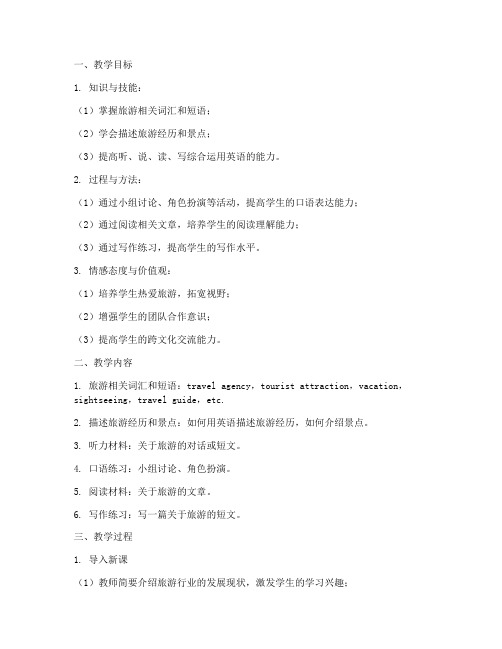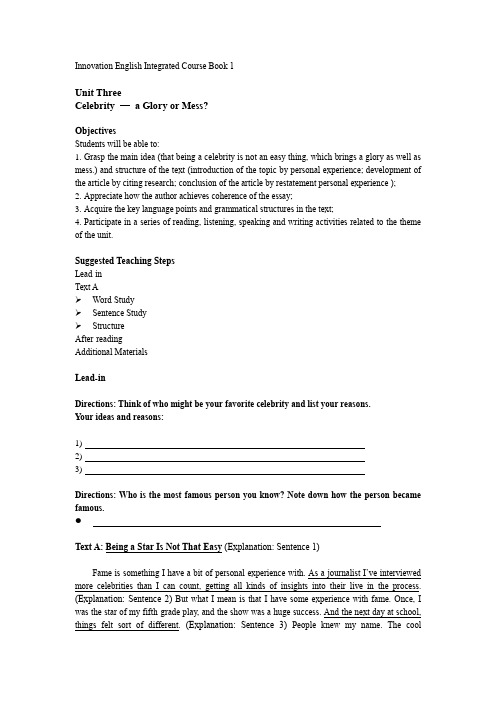英语专业综合教程教案
英语专业:《综合教程》课程思政教学案例(一等奖)

英语专业:《综合教程》课程思政教学案例(一等奖)一、课程简介“综合教程”是英语专业精读课,课时数多,涉及面广,旨在培养学生英语学习听说读写译的各个方面的能力,全面提高学生的理解能力、赏析能力和应用能力。
本课程教学内容广泛,涉及家庭生活、伦理道德、文化教育、政治问题、社会问题、环境问题等一系列课题,使学生在学习语言知识和技能的同时激发心智,开阔视野、养成独立思考、分析批判和理性思维的能力。
同时,课文体裁多样,包括小说、散文、日记、回忆录、演讲词和短剧等多种形式,旨在帮助学生逐步领略和熟悉各种不同体裁的语言形式和文本风格,对于培养学生对名篇的分析和欣赏能力、逻辑思维与独立思考的能力、巩固和提高学生英语的综合运用能力和技能,扩大学生的知识视野,加深学生对社会和人生的理解等方面都具有重要的意义。
相关思政元素:保护环境、人与自然和谐相处、保护生态,人人有责二、教学目标本课程开设的目的在于培养和提高学生综合运用英语的能力。
主要通过语言基础训练与篇章讲解分析,使学生逐步提高语篇阅读理解能力,了解英语各种文体的表达方式和特点,扩大词汇量和熟悉英语常用句型,具备基本的口头与书面表达能力。
鼓励学生积极参与课堂的各种评议交际活动,培养学生自主学习,交际技能和合作学习的能力,提高他们的思想道德素质和科学文化素质,使他们成为能积极思维,灵活思辨,善于发现勇于创造的、有理想、有道德、有文化、有纪律的“四有”新人。
我们只有一个地球,要善待自然一、案例(材料)简介21世纪是科技突飞猛进的时代,也是人类多灾多难的时代。
地震海啸,洪灾干旱,温室效应,厄尔尼诺,从非典到禽流感,从疯牛病到口蹄疫,从2018年埃博拉病毒第二大爆发到2020年的新冠肺炎病毒肆意横行,所有这些灾难都是大自然对人类的集体拷问。
放眼原本美丽的绿色地球,触目惊心的环境污染随处可见:天空昏暗、空气污浊、污水横流、垃圾围城……连远在冰天雪地的南极企鹅体内也发现DDT等农药残余,珠穆朗玛峰也遍地狼藉。
大学英语综合教程教案

课时:2课时教学目标:1. 培养学生的英语阅读理解能力,提高学生的词汇量和语法知识。
2. 培养学生的英语听说能力,提高学生的口语表达和听力理解水平。
3. 培养学生的英语写作能力,提高学生的写作技巧和表达能力。
教学内容:1. 阅读理解:选取一篇适合大学英语水平的中英文对照文章,让学生通过阅读理解,掌握文章的主旨、结构、细节和作者的写作意图。
2. 听力训练:选取一段英语听力材料,让学生通过听力练习,提高听力理解能力。
3. 口语表达:围绕一个主题,让学生进行口语表达练习,提高口语表达能力。
4. 写作训练:让学生撰写一篇短文,提高写作技巧和表达能力。
教学过程:一、导入新课1. 通过提问或讨论,引导学生回顾上节课所学内容,激发学生的学习兴趣。
2. 介绍本节课的学习目标和内容。
二、阅读理解1. 让学生阅读中英文对照文章,注意文章的主旨、结构、细节和作者的写作意图。
2. 提问学生关于文章的问题,检查学生的阅读理解情况。
三、听力训练1. 播放英语听力材料,让学生听懂并理解材料内容。
2. 提问学生关于听力材料的问题,检查学生的听力理解情况。
四、口语表达1. 给定一个主题,让学生进行口语表达练习。
2. 鼓励学生大胆发言,注意语音、语调和表达方式。
五、写作训练1. 让学生根据本节课所学内容,撰写一篇短文。
2. 指导学生注意文章的结构、语法和表达方式。
六、课堂小结1. 回顾本节课的学习内容,总结学生的表现。
2. 布置课后作业,巩固所学知识。
教学评价:1. 课堂参与度:观察学生在课堂上的发言情况,评价学生的参与度。
2. 阅读理解能力:通过提问检查学生的阅读理解情况,评价学生的阅读理解能力。
3. 听力理解能力:通过听力练习检查学生的听力理解情况,评价学生的听力理解能力。
4. 口语表达能力:通过口语表达练习检查学生的口语表达能力,评价学生的口语表达能力。
5. 写作能力:通过写作训练检查学生的写作技巧和表达能力,评价学生的写作能力。
新编大学英语综合教程教案

课时:2课时教学目标:1. 知识目标:(1)掌握本单元的词汇和短语;(2)了解本单元的语法知识,如现在进行时、过去进行时等;(3)提高学生的阅读理解能力。
2. 能力目标:(1)培养学生运用英语进行口语表达的能力;(2)提高学生的听力理解能力;(3)提高学生的写作能力。
教学重点:1. 词汇和短语;2. 语法知识;3. 阅读理解。
教学难点:1. 词汇和短语的运用;2. 语法知识的理解和运用;3. 阅读理解的技巧。
教学过程:第一课时一、导入1. 通过提问学生:“Do you remember your first day at school?”引导学生回忆自己的第一天上学经历,激发学生的兴趣。
2. 向学生介绍本单元的主题:My First Day at School。
二、词汇教学1. 利用PPT展示本单元的词汇,引导学生朗读并记忆。
2. 结合例句,让学生理解词汇的含义和用法。
3. 进行词汇练习,巩固所学词汇。
三、语法教学1. 介绍本单元的语法知识:现在进行时、过去进行时。
2. 通过例句讲解语法知识,让学生理解其用法。
3. 进行语法练习,巩固所学语法知识。
四、阅读教学1. 题目:My First Day at School2. 学生阅读课文,了解文章大意。
3. 提问检查学生对文章的理解。
4. 引导学生分析文章的结构和写作手法。
五、口语教学1. 学生分角色朗读课文,练习口语表达。
2. 针对课文内容,进行口语练习,如:复述课文、回答问题等。
第二课时一、复习1. 回顾上一节课所学的词汇和语法知识。
2. 进行词汇和语法练习,巩固所学知识。
二、听力教学1. 播放听力材料,让学生听取关于第一天上学的经历。
2. 学生回答问题,检查听力理解能力。
3. 分析听力材料,总结听力技巧。
三、写作教学1. 学生根据课文内容,写一篇关于自己第一天上学的短文。
2. 学生互相批改作文,互相学习。
3. 教师点评作文,指出优点和不足。
四、总结1. 回顾本单元所学内容,强调重点和难点。
大学使用英语综合教程教案

教学目标:1. 理解课文的主旨大意,掌握阅读技巧。
2. 扩展词汇量,了解食物相关的表达方式。
3. 培养学生的写作和认知能力。
教学对象:大学英语专业学生教学课时:2课时教学重点:1. 理解课文的主旨大意。
2. 掌握阅读技巧,如略读、扫读等。
3. 扩展词汇量,掌握食物相关的表达方式。
教学难点:1. 理解课文中的复杂句型和长句。
2. 恰当运用食物相关的表达方式。
教学过程:一、导入(10分钟)1. 教师简要介绍本课的主题:食物。
2. 提问学生:你们最喜欢的食物是什么?为什么?3. 学生分享自己的观点,教师总结。
二、课文讲解(40分钟)1. 教师讲解课文的主旨大意,引导学生分析课文结构。
2. 教师讲解课文中的生词和短语,帮助学生理解课文。
3. 教师引导学生分析课文中的复杂句型和长句,帮助学生掌握语法知识。
三、阅读技巧训练(30分钟)1. 教师介绍略读和扫读的技巧,并举例说明。
2. 学生进行略读和扫读练习,教师巡视指导。
3. 学生分享自己的阅读心得,教师点评。
四、词汇扩展(20分钟)1. 教师讲解与食物相关的词汇,如食材、烹饪方法等。
2. 学生分组讨论,列举自己熟悉的食物相关词汇。
3. 学生分享自己的词汇,教师点评并总结。
五、写作训练(20分钟)1. 教师布置写作任务:以“我的家乡美食”为主题,写一篇短文。
2. 学生进行写作,教师巡视指导。
3. 学生分享自己的作品,教师点评并总结。
六、课堂小结(10分钟)1. 教师总结本节课的重点内容,强调阅读技巧和词汇积累的重要性。
2. 学生提出疑问,教师解答。
教学评价:1. 课堂参与度:观察学生在课堂上的发言情况,了解其对课堂内容的掌握程度。
2. 课堂练习:检查学生的阅读技巧和词汇掌握情况。
3. 写作作业:评估学生的写作能力和认知能力。
教学反思:本节课通过讲解课文、阅读技巧训练、词汇扩展和写作训练,帮助学生提高英语阅读和写作能力。
在教学过程中,要注意关注学生的个体差异,因材施教,激发学生的学习兴趣。
大学英语综合教程1教案

一、课题Unit 1:My First Day at College二、教学目标1. 教学目的:(1)帮助学生了解大学生活的方方面面,为适应大学生活做好准备。
(2)提高学生的英语阅读、听力、口语和写作能力。
(3)培养学生的跨文化交际能力。
2. 教学要求:(1)学生能够阅读并理解关于大学生活的英文文章。
(2)学生能够听懂关于大学生活的英文听力材料。
(3)学生能够用英语表达自己在大学生活中的所见所闻。
(4)学生能够撰写关于大学生活的英文短文。
三、教学内容1. 阅读材料:《新标准大学英语》综合教程1 Book One Unit 12. 听力材料:关于大学生活的英文听力材料3. 口语练习:学生分享自己在大学生活中的经历和感受4. 写作练习:撰写关于大学生活的英文短文四、教学重点与难点1. 教学重点:(1)阅读理解:掌握文章的主旨大意和段落大意。
(2)听力理解:捕捉关键词汇和句子。
(3)口语表达:用英语流利地表达自己的观点和感受。
(4)写作能力:运用正确的语法和词汇撰写短文。
2. 教学难点:(1)词汇理解:掌握与大学生活相关的词汇。
(2)语法运用:正确运用英语语法知识。
(3)跨文化交际:了解西方文化背景,提高跨文化交际能力。
五、教学过程1. 导入新课(1)教师简要介绍大学生活的相关背景,激发学生的学习兴趣。
(2)提问:学生对自己大学生活有什么期待?2. 阅读教学(1)学生阅读课文,了解文章主旨大意。
(2)教师讲解文章中的生词、短语和语法结构。
(3)学生分组讨论,分享阅读心得。
3. 听力教学(1)学生听关于大学生活的英文听力材料,捕捉关键词汇和句子。
(2)教师总结听力材料中的主要内容,并引导学生进行复述。
4. 口语练习(1)学生分组讨论,分享自己在大学生活中的经历和感受。
(2)教师鼓励学生用英语表达自己的观点,并给予适当的评价和指导。
5. 写作教学(1)学生根据课文内容,撰写关于大学生活的英文短文。
(2)教师批改作文,指出学生的优点和不足,并进行针对性指导。
新标准职业英语教案综合教程

新标准职业英语教案综合教程一、创新教学目标咱这职业院校的学生啊,那可都有着自己的特点和需求呢。
所以咱这《新标准职业英语综合教程》的教学目标就得有创意、得具体还得能衡量,更得符合咱职业院校英语教学的新要求,重点突出对职业英语能力的培养。
首先呢,知识目标不能少。
学生得掌握一定量的英语词汇、语法和句型。
咱可不是死记硬背啊,得让学生知道这些词汇在职业场景里咋用。
比如说,那些专业术语,像“computer programming”(计算机编程)、“engineering design”(工程设计)啥的,学生得明白是啥意思,还得会用。
语法方面呢,各种时态、语态得搞清楚,别到时候写个英语报告语法错误一堆。
句型也很重要啊,像“I am responsible for...”(我负责……)这种在工作中常用的句型,得让学生熟练掌握。
技能目标也得有。
听、说、读、写、译五项技能都得练起来。
听呢,得能听懂职场中的英语对话、讲座啥的。
比如说,在公司开会的时候,能听懂外国客户或者同事的发言。
说呢,得能流利地用英语进行职场交流,比如做个自我介绍、介绍自己的工作项目。
读,得能读懂英文的职业资料、技术手册啥的。
写,会写英语邮件、工作报告。
译呢,能把中文的职业文档翻译成英文,或者把英文的翻译成中文。
职业素养目标也不能忽视。
培养学生的跨文化交际能力,让他们了解不同国家的职场文化差异。
比如说,在和外国客户打交道的时候,知道人家的礼仪习惯、沟通方式。
还得培养学生的团队合作精神,因为在职场中很多工作都是团队合作完成的。
像小组讨论、项目合作的时候,能用英语和队友进行有效的沟通和协作。
情感目标也很重要哦。
要让学生对英语学习有兴趣,有信心。
不能一看到英语就头疼。
得让他们觉得英语是有用的,能帮助他们在未来的职业发展中更有竞争力。
为了实现这些教学目标啊,咱得想些办法。
比如说,在教学过程中多引入一些真实的职业场景案例,让学生在实际情境中学习英语。
还可以组织一些小组活动,让学生在合作中提高英语能力。
大学英语综合教程的教案

一、教学目标1. 知识与技能:(1)掌握旅游相关词汇和短语;(2)学会描述旅游经历和景点;(3)提高听、说、读、写综合运用英语的能力。
2. 过程与方法:(1)通过小组讨论、角色扮演等活动,提高学生的口语表达能力;(2)通过阅读相关文章,培养学生的阅读理解能力;(3)通过写作练习,提高学生的写作水平。
3. 情感态度与价值观:(1)培养学生热爱旅游,拓宽视野;(2)增强学生的团队合作意识;(3)提高学生的跨文化交流能力。
二、教学内容1. 旅游相关词汇和短语:travel agency,tourist attraction,vacation,sightseeing,travel guide,etc.2. 描述旅游经历和景点:如何用英语描述旅游经历,如何介绍景点。
3. 听力材料:关于旅游的对话或短文。
4. 口语练习:小组讨论、角色扮演。
5. 阅读材料:关于旅游的文章。
6. 写作练习:写一篇关于旅游的短文。
三、教学过程1. 导入新课(1)教师简要介绍旅游行业的发展现状,激发学生的学习兴趣;(2)展示一些著名的旅游景点图片,引导学生用英语描述。
2. 词汇和短语教学(1)教师讲解旅游相关词汇和短语,并举例说明;(2)学生跟读,加深印象。
3. 听力训练(1)播放关于旅游的对话或短文,学生边听边做笔记;(2)教师提问,检查学生的听力理解情况。
4. 口语练习(1)分组讨论:学生分组讨论自己曾经或计划去的旅游景点,用英语介绍;(2)角色扮演:学生扮演导游,向游客介绍景点。
5. 阅读训练(1)学生阅读关于旅游的文章,理解文章大意;(2)教师提问,检查学生的阅读理解情况。
6. 写作训练(1)教师讲解写作要点,指导学生如何写一篇关于旅游的短文;(2)学生独立完成写作练习。
7. 总结与反馈(1)教师总结本节课所学内容,强调重点;(2)学生自评、互评,教师点评。
四、教学资源1. 教材:《大学英语综合教程》;2. 多媒体课件;3. 旅游相关词汇卡片;4. 听力材料;5. 阅读材料;6. 写作练习。
大学英语综合教程 教案_U3

Innovation English Integrated Course Book 1Unit ThreeCelebrity —a Glory or Mess?ObjectivesStudents will be able to:1.Grasp the main idea (that being a celebrity is not an easy thing, which brings a glory as well as mess.) and structure of the text (introduction of the topic by personal experience; development of the article by citing research; conclusion of the article by restatement personal experience );2.Appreciate how the author achieves coherence of the essay;3.Acquire the key language points and grammatical structures in the text;4.Participate in a series of reading, listening, speaking and writing activities related to the theme of the unit.Suggested Teaching StepsLead-inText A➢Word Study➢Sentence Study➢StructureAfter-readingAdditional MaterialsLead-inDirections: Think of who might be your favorite celebrity and list your reasons.Your ideas and reasons:1)2)3)Directions: Who is the most famous person you know? Note down how the person became famous.●Text A: Being a Star Is Not That Easy (Explanation: Sentence 1)Fame is something I have a bit of personal experience with. As a journalist I’ve interviewed more celebrities than I can count, getting all kinds of insights into their live in the process. (Explanation: Sentence 2) But what I mean is that I have some experience with fame. Once, I was the star of my fifth-grade play, and the show was a huge success. And the next day at school, things felt sort of different. (Explanation: Sentence 3) People knew my name. The coolsixth-grade girls said hi to me during recess. I had unintentionally become famous. And it was great.In the years since, our culture’s obsession with celebrity (or, rather, with becoming a celebrity) has grown faster than a middle-aged man’s mustache. (Explanation: Sentence 4)“I would honestly love to be famous,” says fifteen-year-old Katie from Maryland. “I watch movies and shows every day wondering, when will it be my turn to do that?”According to a senior researcher at the Children’s Digital Media Center of a highly rated public university, “Our focus groups have shown that young people are aspiring to fame more than anything else.” (Explanation: Sentence 5) Twenty-year-old Michelle, from California, is one of the many. “I’ve always wanted to be famous, since I was a little girl,” she says. In a survey of 14-to-18-year-olds by The Washington Post, the Kaiser Family Foundation, and Harvard University, 31% of teens went beyond just wanting to be famous and admitted they think it’s likely they’ll be famous someday. Not only that, but a group of girls surveyed by someone said they’d much rather be a famous person’s assistant than be the CEO of a major company. (Explanation: Sentence 6)Someone may have put it best: “I live for the applause …” Yet living solely for others’ cheers is, as we know, a dangerous path. When your self-esteem depends on how much the world loves you, or views your vlog, you’re at its mercy. (Explanation: Sentence 7) And once the attention fades, you’ll be left feeling empty — or worse, if there’s no attention at all, you’ll feel like a complete failure. (Explanation: Sentence 8) Jean M. Twenge, Ph. D., coauthor of the Narcissism Epidemic, points out that dreaming of being on the covers of magazines simply isn’t beneficial to our mental health. “The desire to be famous is connected to unhappiness,” she says. “Research has shown that people who value money, fame, and image are more likely to be anxious and depressed.”So I’m just going to come out and say it: stop fantasizing about being a celebrity. The odds are way against you, and let’s face it: If you were a celebrity, you wouldn’t be able to go to a beach without the paparazzi taking pictures of you. (Explanation: Sentence 9) If you wanted to go outside without makeup you’d be ripped apart in the press, and if you made a totally human mistake you’d be practically put on trial.This brings me back to my fifth-grade experience with stardom. (Explanation: Sentence 10) A few days after the show, the fame began to backfire. Those sixth-grade girls who said hi to me? one of them started a rumor that I’d only gotten the part because of my mom. As my celebrity started to dwindle, and kids stopped inviting me to sit with them at lunch, I realized that I actually preferred being anonymous. Things were so much easier without all the extra attention. So, yes, fame is pretty alluring —the fancy dresses, the VIP treatment, the money. But for now I’ll take my regular life and its surely happier ending. You should, too.Word StudyWord Study: Interviewinterview vt.1) to ask sb. questions about their life, opinions, etc., especially on the radio or television or for a newspaper or magazine 采访e.g. The Prime Minister declined to be interviewed.总理谢绝采访。
- 1、下载文档前请自行甄别文档内容的完整性,平台不提供额外的编辑、内容补充、找答案等附加服务。
- 2、"仅部分预览"的文档,不可在线预览部分如存在完整性等问题,可反馈申请退款(可完整预览的文档不适用该条件!)。
- 3、如文档侵犯您的权益,请联系客服反馈,我们会尽快为您处理(人工客服工作时间:9:00-18:30)。
the comprehension of the textand the structural analysis of the text
课程类型
演示课
教学方法
讲授法,互动法,讨论法
课前准备
reference books,
教学过程
及时间分配
主要教学内容
教学方法
运用
Step1
Give students some questions that are related to the text to discuss and
Part1:1) Whenand where did the writer’s family go for a visit?
2) Why did the family go on a Fourth of July trip?
Part2: 1) Why did the writer say that her first trip to Washington D.C
Washingtontrip.
Part3: paragraph7-17,the most important section of the text.
Concentrate on the major event of the text---- the injustice with which
the writer and her family members had been treated.
the
(The purpose is tocondemn with the author’s own experience racial
presentation
Discriminationin American socห้องสมุดไป่ตู้ety as late as the 1940s)
of the text
B. Class discussion: let them discuss and present their ideas.
30分钟
place of the major events.
Part2: paragraph2-6, to tell usall the necessary preparations, especially
different kinds of food the writer’s mother had prepared for their
讨论法
Lead- in
let thempresent their discussion.
20分钟
Questions: 1: What is special with the date, the Fourth of July in the
United States?
Questions: 2: What does the nameWashington,D.C.signify?
The question: try to divide the text into four parts and find out the main
analysis of
idea of each part of the text.
the text
Part1: paragraph1, provides the background ofthe story, thetime, the
50分钟
C. The important and difficult points in the text
讲授法
1. For each part, there are some questions to ask students in order to
make sure they understand this part clearly.
第一周星期二第1,2节2009年9月9日
课题
Unit1 The Fourth of July 1
课时
2
教学目的
1.To make students understand the text clearly
2.To make students comprehend the new words and expressions and use them freely
3. To make students analyses the structure clearly
教学重点
1.the using of the new words and expressions
2.the comprehension of the textand the structural analysis of the text
Step2
Divide the students into five groups and let students read the text
讨论法
the
quickly andanalyze the structure of it, then present their ideas.
互动法
structural
Was a mobile feast?
2) Give a list of the different foods the writer’s mother had prepared
And prepared.
3)Why did the writer’s mother prepare a variety of foods fro the trip?
Part3: 1) Why was the writer squinting?
2) Do you find some symbolic meaning in Paragraph11?
3) Why did the writer’s father decree another treat?
Part 4: paragraph 18-19, wind up the narrativetext, presenta brief
account of the different effects of the injustice on the black family.
Step 3
A. Brainstorm: let students think about the author’s purpose of writing
